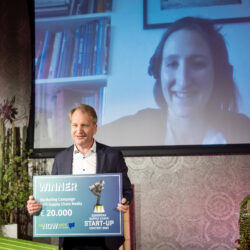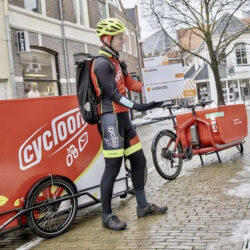European supply chain start-ups heading for consolidation cycle

The number of supply chain start-ups in Europe continues to grow. The current total stands at 220, according to the most recent figures from the soon-to-be-published Supply Chain Management Startups Handbook 2021. These start-ups are also increasingly attracting investors – and their capital is no longer used just for product development, but also for acquisitions. Mathias Bosse, author of the handbook, comments during a recent webinar by Supply Chain Media: “We’re seeing the beginning of a consolidation cycle.”
By Marcel te Lindert
One stand-out supply chain start-up is Winddle, the French company that won Supply Chain Media’s annual European Supply Chain Start-up Contest earlier this year. Its proposition ties in with the strong need for supply chain visibility. But unlike many other start-ups, Winddle’s visibility extends further than just the status of transport orders. “We want to give companies the answer to one pressing question: where are the ordered goods, and in what volumes? More than 80% of supply chain directors lack real-time visibility and direct access to up-to-date information on purchase orders and the supply of materials,” says Emilia Jevakhoff, CEO and co-founder of Winddle, during the webinar.
Winddle provides that visibility from the moment a purchase order is entered into the ERP system to the moment it is delivered to the warehouse. “Various teams are involved in that part of the supply chain and they often depend on external parties such as suppliers, forwarders and logistics service providers for their information. Winddle connects all the teams and external parties together through a digital platform. Over 3,500 supply chain professionals use the platform every day. They benefit from visibility at product, order and shipment level.”
BigMile calculates carbon emissions
BigMile is a promising company that has since outgrown the start-up phase, and it recently won the European Supply Chain Scale-up Contest. BigMile stemmed from an initiative by the Dutch government, which commissioned the development of a practical tool for calculating transport-related carbon emissions to help monitor the transport sector’s progress towards achieving the Paris Agreement’s climate goals. The resulting platform was transferred to BigMile as a commercial enterprise last year. “A standard tool like this will become even more relevant when a carbon tax is introduced in the future, since companies will want to pass the tax on to their customers. This will avoid discussions about the right amount of tax,” says Jan Pronk, CCO of BigMile, as third expert in the webinar.
Every company that has data on the starting point, destination and volume of a shipment can calculate its carbon emissions via the BigMile platform. The calculation method is in line with existing standards using basic figures utilized for this purpose in various countries. BigMile users can share the result with their supply chain partners via the platform. As more data becomes available, companies can refine the calculations and generate more insights. Although the company started out in the Netherlands, it has already expanded beyond national borders. Pronk: “We opened an office in Germany earlier this year.”
Supply chain is hot among investors
Supply chain start-ups are now firmly on the radar of investors. A global survey by McKinsey in autumn 2020 showed that the total amount invested grew by an impressive 71% per year between 2014 and 2019. Mathias Bosse, who is also an investor at Seed+Speed Ventures, has noticed this trend too: “Investments have increased significantly, especially in the last three to four years – not only in the USA, but also in Europe. Logistics and supply chain start-ups are hot among investors.”
Strikingly, most of the investments are focused on start-ups in last-mile and parcel distribution, yet that is a relatively small market. Online platforms for road transport receive less capital, even though they serve a much larger market. “The margins in road transport are low and the volumes are high, so it’s all about volume – just as it is in last-mile and parcel distribution. Start-ups that want to be successful will have to attract large volumes in order to gain sufficient critical mass. That means they have to grow quickly, which requires capital.”
On-demand warehousing failing to deliver
Supply Chain Media publishes an annual overview of the most important start-ups in Europe. They are divided into ten categories, ranging from supply chain visibility to inventory optimization and from blockchain to last-mile delivery. The overview shows which start-ups are making progress and have reached scale-up status, i.e. have attracted more than EUR 2 million in venture capital. However, according to webinar moderator Martijn Lofvers, CEO of Supply Chain Media, the situation is not equally rosy in every category: “We’ve seen a few companies disappear, especially in on-demand warehousing. It seems that the use of online platforms to search for storage space is not delivering on the expected potential.”
The research shows that investors continued to invest in start-ups in 2020 despite – or perhaps because of – the coronavirus pandemic. Blockchain and ocean freight start-ups seem to becoming particularly popular among investors. The growth in e-commerce has also led to more capital being invested in last-mile delivery. Two start-ups that stand out are Budbee and Paack, which have raised EUR 52 million and EUR 44 million in capital, respectively. Bosse: “They are just two examples, but there are more. The growth is also linked to increased maturity. Many start-ups were founded three or four years ago and are now in the growth phase, so they are able to attract more capital.”
Consolidation among start-ups
Bosse himself is busy compiling the Supply Chain Management Startups Handbook 2021. It will contain profiles of no fewer than 220 start-ups from 27 European countries, supplemented by ten experts from various disciplines. He can already draw a number of conclusions: the average start-up was founded 4.3 years ago and employs 34 people. The largest number of start-ups come from Germany (81), followed by the United Kingdom (19), France (16), the Netherlands (16) and Switzerland (16). As many as 30% of the start-ups offer solutions that in some way increase transparency in the supply chain.
Bosse has also looked at funding. Of the 220 start-ups, 137 are funded by capital from external investors, amounting to nearly USD 2 billion in total. “The start-up with the most capital, a whopping EUR 350 million, is Sendder,” Bosse explains. Sennder positions itself as a digital freight forwarder. It has spent much of the capital on acquiring other start-ups, including Uber Freight Europe, Everoad, Innroute and Cars&Cargo. Instabox and Shippeo have also been on the acquisition trail. “And rumours are circulating of many more acquisitions. It seems we’re seeing the beginning of a consolidation cycle among supply chain start-ups.”
Watch the recording of the this webinar on YouTube here.









